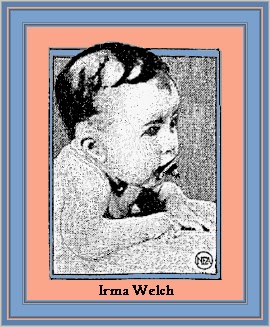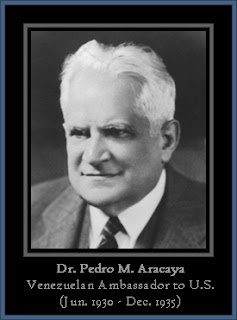NOTE: This is one of the most remarkable child custody cases on record. It involves the earliest instance (known to this writer) of a public demonstration campaign on the part of a father seeking to enforce his parental rights. James Welch of New Orleans not only had a flair for public display but he even published a newsletter promoting his cause. His plea for assistance from the Department of State was entered into the Congressional Record. James Welch was persistent and, against all odds, gained custody of his Venezuelan-born daughter, whom the Venezuelan dictator’s government wished to see remain with the maternal grandmother.
***
FULL TEXT (Article 1 of 5): Washington D. C. – After a
steady stream of congressional denunciation heaped upon it for two months the
state department has finally decided to act to restore to her American father
Irma Francisco Welch, 18 months old, taken by Venezuelan authorities one year
ago.
A telegram requesting Venezuelan government to guarantee
safe conduct for James E. Welch, the baby’s father, to visit Venezuela and
obtain his daughter has just been dispatched, state department officials informed Welch Tuesday.
Action was not taken until Representative Gasque (Dem., S.
C.) had publicly charged the state department with supporting the Gomez regime
in Venezuela, until Senator Ransdell (Dem., La.) had charged the department
with flouting the right of American citizens, until Mr. Welch had declared that
the Gomez government would be out of office in a few months were it not for the
barking it receives from Andrew W. Mellon’s oil companies, and until several
thousand dollars worth of unfavorable publicity in the form of books and
statements by Venezuelan exiles regarding the Gomez government had been
circulated on Capitol hill.
~ Story by Father ~
Welch’s story of a year’s effort to recover the custody of his baby is one which has
aroused considerable sympathy among members of the senate foreign relations
committee.
In a sworn statement published ion the Congressional Record,
Welch tells of going to Venezuela and engaging in business there.
“I lived in Venezuela unmarried until 1926,” Welch said,
“when I met Anna Salazar, daughter of a prominent citizen of Spanish descent. I
am of Protestant faith and Anna of Catholic, and while I desired to contract a
marriage with her through religious ceremony, it could not be satisfactorily
arranged. Following a generally accepted custom of that country, I regularly
set her up in my home as my wife and openly lived with her as such. In October,
1928, there was born to me and Anna Salazar a daughter, whom we named Irma
Francisco Welch.
“It was necessary for me to be away from home for a large
part of my time. During one of these Absences I learned that Anna had become a
victim of the Gomez regime, who prey upon the women of Venezuela.”
Welch said that his wife had abandoned the daughter to him
and that after consulting one of the ablest lawyers in Venezuela he got custory
of the child, obtained a trained nurse and left her for Ciuadad Bolivia,
taking the baby with him.
~ Is Finally Released ~
“I had proceeded about 300 miles by automobile when I was
arrested upon a telegraphic order from officials in the state of Bolivar.”
Welch said he was thrown in a “filthy jail” and the child
“forcibly taken” from him.
After 43 days, Welch said, he was ordered released by a
judge. After trying in vain to gain custody of his child Welch declared, he
decided to come to the United States and obtain from the state department the
same assistance it had given the oil companies.
Meanwhile the infant remains neither with her father nor her
mother, Welch said.
[“U. S. Will Act to Aid Father Recover Child, syndicated,
The Milwaukee Journal (Wi.), Jul. 9, 1930, p. 25]
***
PHOTO CAPTION (standalone) (Article 2 of 5): SHACKLED IN PRISON – J. E. Welch demonstrates in Washington shackles he was forced to wear in Venezuela jail. He has been trying to get aid for a small daughter still held in Venezuela.
***
FULL TEXT (Article 3 of 5): Washington, Sept. 21.—By far the most persistent and active lobbyist to appear here this generation is the redheaded, blue-eyed James E. Welch,
Welch lobbied for 22 months for the custody of his child who was held in Venezuela
The child was in Venezuela Washington
Soft-spoken and unobtrusive in manner, not highly cultured, Welch has camped the State Department steps. He has interviewed dozens of members of Congress and caused introduction of legislation for investigation of his case and of our relations with
Governor Huey Long of Louisiana U. S. Louisiana
Welch attracted so much publicity and sympathy everywhere that the Venezuelan minister advertised in the New York Spanish press that Venezuelans who helped Welch were subject to long imprisonment at home. The State Department issued a detailed publication denying that it had refused Welch justice and protection because Venezuela
Whatever the technical points of Venezuelan and international law may be, here is, briefly, the story of Welch, the champion lobbyist:
Welch was in the oil business in Mexico Colombia Venezuela Maracay
Welch went on business to Caracas
Welch languished 43 days in one of those Venezuelan prisons which by common repute are so horrible, watching men starve and go insane. Friends brought him food and saved him from starvation. He says the American vice-consul advised him to buy his freedom by paying off his accusers. The head of a British oil combine finally obtained his release. The charge d’affaires at the American legation in
Welch claims recently to have discovered a forged document in the file of his case which had enabled a Venezuelan attorney to double-cross him by withdrawing his case at a critical point. His lawyers and the State Department argued whether the document is unquestionably a forgery, until Welch was informed he would get the baby.
[Rodney Dutcher, Washington Letter (column, syndicated (NEA Service), The Frederick Post (Md.), Sep. 22, 1931, p. 5]
PHOTO CAPTION (Article 4 of 5): Five-year-old Irma Francesca Welch in arms of her American father, James E. Welch, Shrevesport, La., who plans to file $1,000-a-day claim against Venezuelan government for their four-year separation.
FULL TEXT: Center of more attention than she has ever known, 5-year-old Irma Francesca Salazar Welch is ready to settle down to normal existence in the home town of her father, James E. Welch, in Shrevesport, La.
Yesterday Welch and his daughter, a Venezuelan beauty, called at the State Department to thank officials for intercession in a case that attracted attention.
Born in Venezuela, with no knowledge of English, the little girl has not the slightest idea of what all the excitement is about.
~ Dr. Arcaya Explains. ~
Yet, Dr. Pedro M. Aracaya, Venezuelan Minister, saw fit to issue a formal statement on the case. He said:
“There is not and never has been any diplomatic controversy between the government of Venezuela and that of the United States regarding Irma, the daughter of James E. Welch.
“There has been in the courts of the State of Bolivar, Venezuela, several criminal and civil suits between Welch and the grandmother of his daughter on the question of the custody of his child.”
All this, the minister said, is Welch’s private affair.
Private or not, the Welch case become public property in the more than four years’ struggle by Welch. In that time he has played the role of kidnaper of his own child for which, under Venezuelan laws, he was subjected to 43 days in the police barracks at Bolivar.
~ State Department Aids. ~
Unable to enter the country where his romance began, Welch succeeded in having State Department officials arrange for landing of his daughter on British territory – Trinidad. There the reunion was effected. Welch and the girl flew to Miami. They came to Washington primarily to thank William Phillips and Harry F. Payer, of the State Department.
The girl’s mother disappeared shortly after the child was born, but there is an American grandmother waiting for Irma in Shreveport.
Today Welch plans to visit the Senate and House Office Buildings to thank senators and representatives who interested themselves in his case.
It is understood Welch intends to file suit against the Venezuelan government, asking $1,000 a day for the four years the child was kept from him. This totals $1,460,000.
[“Seeks $1,000 a Day for 4-Year Separation – Girl Freed by U. S. Aid Here With Father to Thank Officials. – Diplomatic Controversy Over Case Denied by Venezuela Convoy,” The Washington Post (D.C.), Oct. 10, 1933, p. 22]
PHOTO CAPTION (standalone) (Article 5 of 5): Diplomatic aid brought about the reunion of little five-year-old Irma Francesca Welch and her father, James E. Welch (center), after a separation of more than four years while Irma was in custody of a guardian in Venezuela and her father was jailed for kidnaping in an attempt to recover his child. They are shown thanking Assistant Secretary of State Payer in Washington. Welch and his daughter will live in Shreveport, La. (Associated Press Photo)








No comments:
Post a Comment